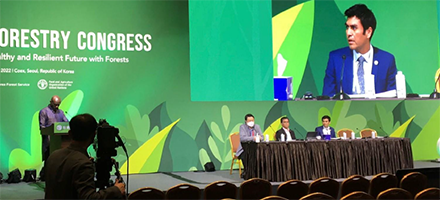The Australian Forest Products Association has highlighted the enormous opportunity the global push for more sustainable, low-emission industries is presenting for the world’s forest industries. Source: Timberbiz
Speaking at the World Forestry Congress in Seoul co-hosted by the United Nations Food and Agriculture Organization, AFPA Deputy Chief Executive Officer Victor Violante spoke about how recent major global events, such as the COP 26 pledge by more than 100 nations to end and reverse deforestation by 2030, and ambitious emissions reduction goals to combat climate change, meant the world will need even more sustainable building and packing products than ever before.
But he cautioned that developed countries must do their part to ensure that developing nations aren’t left to do the heavy lifting.
“Even before these ambitious goals the world was already on track to need more than four times the forest products by 2050 than we currently produce,” Mr Violante said.
“Global demand for cross-laminated timber to replace steel and concrete in the building construction sector, and the uptake of non-plastic packaging materials, is increasing at an annual rate of more than 15% – yet few countries are tackling the difficult question of where this fibre will come from, and what impact will this have on workers and businesses in developing countries that are already doing the heavy lifting?”
The theme for this year’s Congress is Building a Green, Healthy and Resilient Future with Forests, and Mr Violante spoke on a panel on the subject Advancing decent work, green jobs and sustainability in the forest sector, co-organised by the International Labour Organization (ILO), FAO, UNECE, and the Korea Forest Service. The ILO is a United Nations agency whose mandate is to advance better international labour standards.
“When countries like Australia that are net importers of forest products drastically reduce their domestic timber production, as the Victorian and WA decisions to close their sustainable native hardwood timber industries will lead to, it puts even more pressure on developing countries that are already trying to address illegal logging, worker exploitation and deforestation to produce more timber,” Mr Violante said.
“Australia should be a world leader in securing our own and the world’s future timber and forest product needs – not just so we have enough timber to build our own homes, but also to ensure that the rest of the world can transition to more sustainable forestry practices as we have here in Australia,” he said.






